Trust the Process
Notes
Trust the process means that we should put our trust on Systematical Thinking, by understanding what are the most likely outcomes following certain actions, we should trust that sticking to those actions will produce the best results, even if some Uncertainty is involved within it. For example, if we want to write a book, it is enough to focus on writing half an hour every day. The final result (a finished book), would come eventually, so there's no point in worrying about it.
The small steps we do today are what ensures us that we will reach our destination.
We usually hold in a high regard the importance of goals, especially as our main tool for success. However, focusing solely on goals can be problematic because:
- Lack clarity - goals are usually more abstract, so it's harder to translate a goal into real life actions. For example, "I want to be successful writer" - what does that mean? When have I achieved it? (Related:: Ambiguity)
- short sighted - what happens if you complete your goal? then you're left with nothing, and you have to start the process all over again. Usually at a price of deflation of motivation. Meaning goals can often serve as a External Motivation, a reward at the end of the tunnel which leaves us empty once we reach it.
- Don't change who we are - we can say to ourselves "I want to lose weight", and we might even achieve it, but we are still the same person.
- Binary thinking - Goals are often binary, either we reached them or not, which fails to capture the complexity of human behavior and motivation.
Habits, on the other hand, are more reliable. Mainly because a habit is an expression of our identity change starts from the inside out. Instead of "I want to lose weight", habits say "I want to become a healthy person".
Additionally, habits reframe the meaning of success from a binary yes/no to a continuum. Missing a habit for a day doesn't mean you have failed.
Furthermore, by preforming good habits, you can be certain that you make good progress daily, so that the outcomes you wish for will come naturally "by themselves". At first the results look insignificant, but over time they compound. For example, writing 15 minutes a day doesn't sound a lot if you wish to become a writer, but when it translates into 7.5 hours a month it suddenly sounds enough to do something towards your goal.
Focus on the process, not the outcome.
Visual

Overview
🔼Topic:: Habits (Map) 🔼Topic:: workflows (Map) 🔼Topic:: Success (Map) ↩️Origin:: 🔗Link::